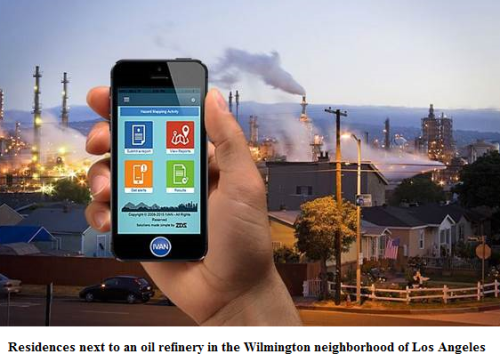"Environmental justice, online, on steroids" - IVAN (Identifying Violations Affecting Neighborhoods). Credit: Take-Part.com / A Planetshifter.com Re-post
"Environmental justice, online, on steroids" - IVAN (Identifying Violations Affecting Neighborhoods). From a Take-Part.com article /Planetshifter.com PR
A coalition of activists and government agencies created a website where residents can upload photos, videos, and other evidence of environmental lawbreaking. The key to IVAN's success, the report states, is bringing together environmental justice advocates and government officials, two groups that often have had an antagonistic relationship.
* * * * * * *
A high-tech program that lets residents of low-income communities in California upload photos, videos, and other information
catching polluters in the act should be expanded across the state, according to a
new report by the
UC Davis Center for Regional Change.
Identifying Violations Affecting Neighborhoods or
IVAN is an environmental neighborhood watch program bringing together local, state, and federal authorities with environmental justice advocates to respond to reports made on the program's website about leaking oil pipes, water contamination from cattle feedlots, and other pollution. The site also allows residents to view maps showing the location of alleged violations of environmental laws as reported by their neighbors. That also helps government agencies target areas for enforcement.
Hundreds of reports have been filed on the website since 2009 from low-income areas of Los Angeles and San Francisco, as well as the oil and farm belt of California's Central Valley, one of the State's most heavily polluted regions. "Photos and videos have also provided public agencies with critical information needed to carry out enforcement actions by capturing time-sensitive activities that might have been missed by public agency staff otherwise," wrote report coauthors Jonathan London and Shrayas Jatkar.
So, Why Should You Care?
Numerous studies have shown that low-income and minority communities are home to a disproportionate share of industrial facilities and are likely to suffer higher rates of cancer and other health effects of pollution. "People of color and low-income people are much more likely to live in a highly polluted environment than white people and wealthier people," said London, a community development professor and director of the Center for Regional Change at the University of California, Davis.
The idea is to avoid drawn-out fights like the one Tom Franz, a farmer in Shafter, near Bakersfield, waged in 2012 after he videotaped an oil company dumping fracking fluid into an open pit at the edge of town. Franz reported the incident to the California Environmental Protection Agency, which forwarded it to the region's water quality control board, where it remained in limbo for months.
Franz and local environmental justice community organizations then founded a local branch of IVAN and began protesting the inaction. Eventually, state regulators fined the oil company $60,000 and began to investigate other drilling operations. Today residents of the Bakersfield area can file online reports, photos, and videos to IVAN about everything from the burning of agricultural waste and pesticides to odor from cattle feedlots. Here's how it works. Say you're a resident of Wilmington, a
South Los Angeles neighborhood that sits in the shadow of a massive oil refinery, and you spot a leaking pipe. You can fill out a report on the IVAN website and upload photos and video. A task force of environmental justice advocates and government representatives reviews the reports and, if warranted, delegates the investigation to the appropriate agency.
London and Jatkar's report recommends IVAN improve access to funding so it can expand to other regions of the state.
"IVAN task forces can often identify spatial and temporal patterns of hazards and potential violations better than government agencies or community organizations working alone," London and Jatkar wrote. "This can help guide the deployment of limited enforcement resources to the places and problems that require the most urgent attention."

